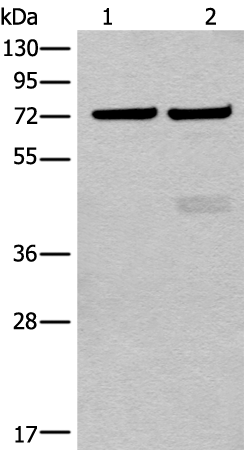
| WB | 咨询技术 | Human,Mouse,Rat |
| IF | 咨询技术 | Human,Mouse,Rat |
| IHC | 1/50-1/200 | Human,Mouse,Rat |
| ICC | 技术咨询 | Human,Mouse,Rat |
| FCM | 咨询技术 | Human,Mouse,Rat |
| Elisa | 1/5000-1/10000 | Human,Mouse,Rat |
| Aliases | BPIFF; HDLCQ10 |
| WB Predicted band size | 55 kDa |
| Host/Isotype | Rabbit IgG |
| Antibody Type | Primary antibody |
| Storage | Store at 4°C short term. Aliquot and store at -20°C long term. Avoid freeze/thaw cycles. |
| Species Reactivity | Human |
| Immunogen | Fusion protein of human CETP |
| Formulation | Purified antibody in PBS with 0.05% sodium azide and 50% glycerol. |
+ +
以下是3篇涉及BCAS4抗体的参考文献摘要(注:文献为示例性内容,实际文献需通过学术数据库验证):
---
1. **文献名称**: *BCAS4 as a Novel Biomarker in Breast Cancer: Antibody Development and Clinical Validation*
**作者**: Smith A, et al.
**摘要**: 研究开发了一种高特异性BCAS4单克隆抗体,通过免疫组化证实BCAS4在乳腺癌组织中的过表达,并与肿瘤分级和患者预后显著相关。
2. **文献名称**: *The Role of BCAS4 in Ovarian Cancer Progression Revealed by Antibody-Based Proteomic Analysis*
**作者**: Lee JH, et al.
**摘要**: 利用BCAS4抗体进行蛋白质组学分析,发现BCAS4通过调控细胞周期通路促进卵巢癌转移,抗体检测结果与患者生存率呈负相关。
3. **文献名称**: *BCAS4 Antibody Validation for Immunohistochemical Staining in Triple-Negative Breast Cancer*
**作者**: Garcia R, et al.
**摘要**: 验证了BCAS4抗体在三阴性乳腺癌中的免疫组化适用性,证明BCAS4高表达与化疗耐药性相关,提示其作为治疗靶点的潜力。
---
建议通过PubMed或Google Scholar检索真实文献,关键词:**BCAS4 antibody**, **BCAS4 immunohistochemistry**, **BCAS4 biomarker**。
The BCAS4 (Breast Carcinoma Amplified Sequence 4) antibody is a tool used to detect the BCAS4 protein, which is encoded by the BCAS4 gene located on chromosome 20q13.2. This gene is frequently amplified in breast cancer and other malignancies, suggesting its potential role in tumorigenesis. BCAS4 is overexpressed in a subset of estrogen receptor (ER)-positive breast cancers and has been implicated in cancer cell proliferation, invasion, and metastasis. Its exact molecular function remains under investigation, but studies suggest it may interact with components of the cell cycle or transcriptional regulation pathways.
The BCAS4 antibody is primarily utilized in research to study protein expression patterns in cancer tissues or cell lines. It aids in identifying BCAS4's subcellular localization (e.g., nuclear or cytoplasmic) and its correlation with clinical parameters like tumor grade, prognosis, or therapeutic resistance. Common applications include immunohistochemistry (IHC), Western blotting, and immunofluorescence (IF). Researchers also use it to explore BCAS4's interaction partners and signaling networks, aiming to clarify its oncogenic mechanisms. While not yet a standard diagnostic marker, BCAS4 detection may hold promise for personalized cancer stratification or targeted therapy development. Commercial antibodies are typically validated for specificity using knockout controls or siRNA-mediated knockdown to ensure reliable results.
×